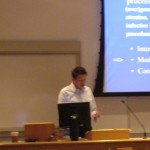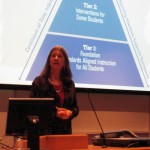Tuesday, February 7, 2012, 3:30, Kiva Auditorium
 Dr. Diane Larsen-Freeman, University of Michigan
Dr. Diane Larsen-Freeman, University of Michigan
Title: Transforming conceptions of language and its development: What is on offer from complexity theory
Abstract: Alton Becker has written that our understanding of language is the single-most important influence on how we go about teaching one. Recently, atomistic views of language, our legacy from structuralism, have been replaced by more emic, socially situated, and dynamic views. If Becker is right, such a shift has significant consequences for how a language is learned and how it is taught. In this talk, I will draw on complexity theory to propose that language is a complex adaptive system. I will show how this vie w of language contrasts not only with traditional views of language, but also with mainstream views of language acquisition. I will conclude by suggesting ways that teaching language must shift, too.
w of language contrasts not only with traditional views of language, but also with mainstream views of language acquisition. I will conclude by suggesting ways that teaching language must shift, too.
Tuesday, February 14, 2012, 3:30, Kiva Auditorium
 Dr. William Labov, University of Pennsylvania
Dr. William Labov, University of Pennsylvania
Title: The role of emotions in reading intervention
Abstract: In the course of this presentation, I will focus on the approach of our Penn Reading Initiative (pri.sas.upenn.edu) to the task of engaging the interest of alienated and discouraged readers. This involves not only the graphic novels that spearhead our program, but a number of strategies like the Language Experience method that generate interest by engaging the social and emotional concerns of struggling readers.
Video of Dr. Labov’s lecture
(There are 7 parts to the video: Once you go to this first part, there is a button just above the picture that says “7 videos.” If you click on that, it will take you to the other 6 parts.)
Monday, March 19, 2012, 3:30 pm, Kiva Auditorium
 Dr. Alex Housen, University of Brussels, Belgium
Dr. Alex Housen, University of Brussels, Belgium
Title: Were they taught or did they learn? A framework for investigating the role and effect(iveness) of instruction in Second Language Learning
Abstract: Instruction has always been a key component of the language learning experience of most L2 learners but its role in the acquisition of a second or foreign language (L2) has been controversial ever since antiquity. Language teachers are often puzzled about the apparent discrepancy between what their students are taught, what they learn and (seem to) know, and what they can actually do in their L2. But whatever their allegiance to a particular language teaching method, all language teachers will probably agree that some kind of instruction is necessary for successful L2 learning. The research community, however, is more divided. There are researchers who believe that instruction is futile as second language acquisition (SLA) is essentially an intuitive process guided by innate mechanisms which cannot be influenced by pedagogical intervention. On the other hand, there are those who believe that instruction is effectiv e in its own right, that it can make a difference in how (well) learners learn an L2, and that in some cases instruction will even be necessary for successful SLA. Fuelled by this debate, the past two decades have seen an explosion of research on the effects of instruction in L2 learning, producing an abundance of mixed and sometimes even contradictory findings. The aim of this presentation is twofold: (a) to propose a taxonomic framework that identifies major dimensions along which the roles and effects of instruction on L2 learning can be fruitfully investigated and (b) to synthesize general research findings in terms of this framework. This proposed framework considers both (1) the nature of the role(s) and effect(s) of instruction on L2 learning and (2) the factors that moderate these effects and, hence, the effectiveness of instruction for L2 learning and teaching (part 2). In the first part of this talk I will thus propose that the variegated roles and effects of instruction should be envisaged in terms of (1) the different components of the SLA process, (2) the different dimensions of the SLA process, (3) the cognitive mechanisms of SLA, (4) the different types of L2 knowledge that L2 learners develop, and (5) the major dimensions of L2 performance and L2 proficiency. In a second part I will argue that whatever the exact nature of the effects of instruction on L2 learning, these effects will be moderated by at least the following factors: (1) the type of learner, (2) the type of instruction, and (3) the type of L2 feature targeted by the instruction. Each of the components of this framework will be discussed in turn and illustrated with findings from key studies.
e in its own right, that it can make a difference in how (well) learners learn an L2, and that in some cases instruction will even be necessary for successful SLA. Fuelled by this debate, the past two decades have seen an explosion of research on the effects of instruction in L2 learning, producing an abundance of mixed and sometimes even contradictory findings. The aim of this presentation is twofold: (a) to propose a taxonomic framework that identifies major dimensions along which the roles and effects of instruction on L2 learning can be fruitfully investigated and (b) to synthesize general research findings in terms of this framework. This proposed framework considers both (1) the nature of the role(s) and effect(s) of instruction on L2 learning and (2) the factors that moderate these effects and, hence, the effectiveness of instruction for L2 learning and teaching (part 2). In the first part of this talk I will thus propose that the variegated roles and effects of instruction should be envisaged in terms of (1) the different components of the SLA process, (2) the different dimensions of the SLA process, (3) the cognitive mechanisms of SLA, (4) the different types of L2 knowledge that L2 learners develop, and (5) the major dimensions of L2 performance and L2 proficiency. In a second part I will argue that whatever the exact nature of the effects of instruction on L2 learning, these effects will be moderated by at least the following factors: (1) the type of learner, (2) the type of instruction, and (3) the type of L2 feature targeted by the instruction. Each of the components of this framework will be discussed in turn and illustrated with findings from key studies.
Thursday, March 29, 2012, 5:30 pm, Kiva Auditorium
Title: Response to Intervention (RTI) for English Language Learners
Abstract:
In this talk, the presenter will discuss common challenges faced by educators as they implement RTI in culturally and linguistically diverse schools with English language learners, and offer suggestions for addressing these challenges. She will show actual examples of literacy instruction for English language learners from a school implementing an RTI model for the first time. Finally, she will offer a culturally and linguistically responsive RTI model and suggest how to implement RTI in feasible, effective ways.
Suggested Reading for the Talk:
Klingner, J. K., & Edwards, P. (2006). Cultural considerations with response to intervention models. Reading Research Quarterly, 41, 108-117.
Bio:
Janette Klingner is Professor of Education at the University of Colorado at Boulder in the Educational Equity and Cultural Diversity program area. She was a bilingual special education teacher for ten years before earning a PhD in reading and learning disabilities from the University of Miami. To date she has authored or co-authored more than 100 articles, books, and book chapters, and presented at numerous national and international conferences, frequently as a keynote speaker. Her principal areas of research focus on reading comprehension strategy instruction for culturally and linguistically diverse students and Response to Intervention for English Language Learners. Currently, she is the principal investigator on an i3 validation grant in partnership with Denver Public Schools and Padres Unidos, Collaborative Strategic Reading-Colorado (CSR-CO), the principal investigator on a demonstration project funded by the U.S. Department of Education, RTI Effectiveness Model for English Language Learners (REME), and a co-principal investigator on a research project funded by the U.S. Department of Education Institute of Education Sciences (IES), CSR for Struggling Adolescent Readers.  Until recently, she was a co-principal investigator for NCCRESt, the National Center for Culturally Responsive Educational Systems, a U.S. Department of Education funded project to address the disproportionate representation of culturally and linguistically diverse students in special education. Janette currently is President-Elect for the Council for Exceptional Children’s Division for Learning Disabilities and a Vice-President for the International Academy for Research on Learning Disabilities. In 2004 she was honored with the American Educational Research Association’s Early Career Award.
Until recently, she was a co-principal investigator for NCCRESt, the National Center for Culturally Responsive Educational Systems, a U.S. Department of Education funded project to address the disproportionate representation of culturally and linguistically diverse students in special education. Janette currently is President-Elect for the Council for Exceptional Children’s Division for Learning Disabilities and a Vice-President for the International Academy for Research on Learning Disabilities. In 2004 she was honored with the American Educational Research Association’s Early Career Award.
Watch Dr. Klingner’s lecture here!
